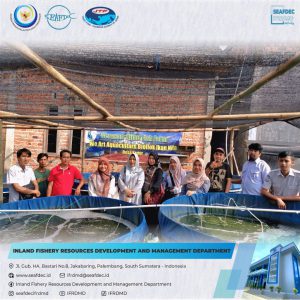Strengthening Livelihood Diversification and Fisheries Co-Management in Muara Enim
 A field visit was conducted on 3–5 September 2025 in Muara Enim Regency, South Sumatra Province, under the project Improving Fishers’ Livelihood and Fisheries Co-Management in Inland and Coastal Small-Scale Fisheries (funded by JTF 7). As one of the project’s pilot sites, Muara Enim provided valuable insights into fisheries-related livelihood diversification and opportunities for strengthening community-based co-management.
A field visit was conducted on 3–5 September 2025 in Muara Enim Regency, South Sumatra Province, under the project Improving Fishers’ Livelihood and Fisheries Co-Management in Inland and Coastal Small-Scale Fisheries (funded by JTF 7). As one of the project’s pilot sites, Muara Enim provided valuable insights into fisheries-related livelihood diversification and opportunities for strengthening community-based co-management.
The mission engaged directly with fisheries community groups supported by extension officers from the Ministry of Marine Affairs and Fisheries (MMAF) and the Muara Enim District Fisheries Office. These groups consist of capture fishers, fish farmers, fish processors, and fish marketers—each contributing significantly to sustaining and advancing the local fisheries economy. Extension officers have been actively guiding them through training, facilitation, and mentoring to build knowledge, enhance technical skills, and foster positive attitudes toward sustainable fisheries. This support aims not only to improve individual capacities but also to strengthen the collective resilience of community-based economic institutions.
Interviews with extension officers and fisheries stakeholders, complemented by discussions with staff of the District Fisheries Office, identified several priority areas for capacity building. These include strengthening technical expertise, improving business and marketing strategies, and expanding access to financial resources and institutional support. Addressing these needs will bring dual benefits: empowering fisheries officers with better tools and knowledge, while equipping communities with the skills to diversify their livelihoods and improve their economic resilience.
This activity reflects the broader objectives of the project—promoting co-management and livelihood diversification as pathways to sustainable fisheries. By reinforcing the capacities of both fisheries officers and local communities, the initiative helps ensure that small-scale fishers and related actors are better prepared to navigate socio-economic and environmental challenges while continuing to contribute to food security and local development.
